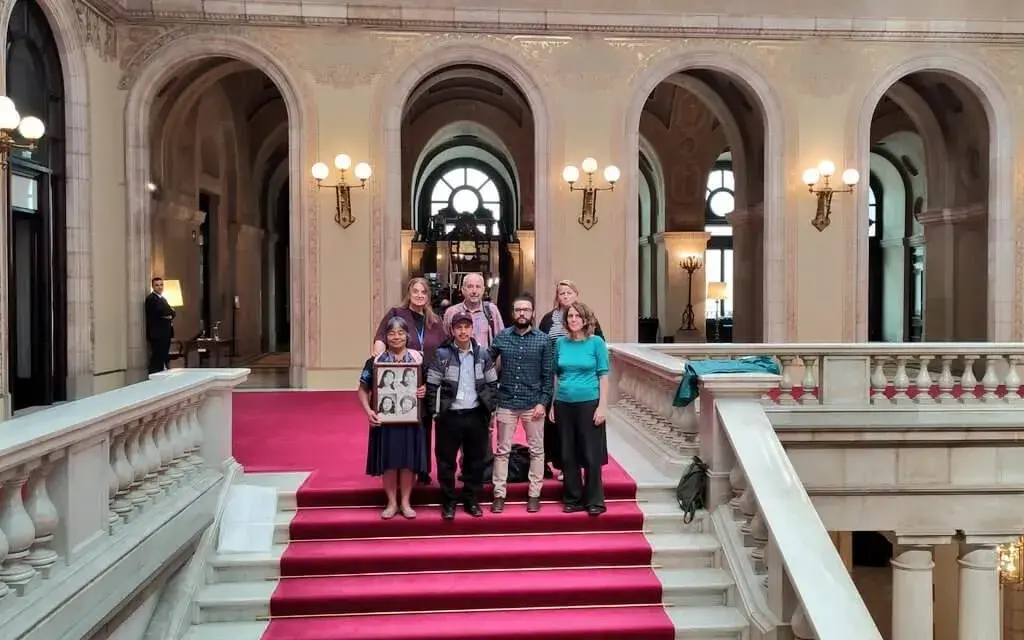Application of Universal Justice for the Leaders of Colombia and Transitional Justice in Guatemala
A delegation of human rights organizations and survivors are fighting to ensure that justice in all its forms can hold top political and military leaders from Guatemala and Colombia accountable for killings, forced disappearances, and genocide.
Three individuals directly involved in the trials of high-ranking political and military officials are taking part in the European tour on Transitional Justice organized by Peace Brigades International (PBI). They come from Colombia and Guatemala and are carrying out a historic fight. In Colombia’s case, they are also defending the legitimacy of using Universal Jurisdiction as a complementary means for victims to guarantee truth, justice, and non-repetition, where transitional justice falls short.
Colombia and the So-Called ‘False Positives’
In Colombia, with the signing of the 2016 Peace Agreement, the Special Jurisdiction for Peace (JEP) was created, based on restorative justice and placing victims at the center.
However, this legal system generates many uncertainties, especially in Case 003, ‘Killings and Forced Disappearances Illegitimately Presented as Combat Deaths by State Agents’, referring to the so-called ‘false positives’. Concerns regarding the progress of the JEP in this case include the effective participation of victims, the risk of perpetrators remaining unpunished due to the type of sanctions imposed, and the renunciation of criminal prosecution that this implies.
Additionally, the JEP has limitations, such as the fact that high-ranking civil officials, particularly former Colombian president Álvaro Uribe Vélez, cannot be investigated or tried by the JEP, even if they wished to voluntarily submit to it.
For this reason, three human rights organizations (the Corporación Jurídica Libertad, the Comité de Solidaridad con los Presos Políticos, and the José Alvear Restrepo Lawyers' Collective) and eleven victims of extrajudicial executions filed a complaint in Argentina in November 2023 against Uribe for his possible criminal responsibility in the ‘false positives’ case during his presidency, invoking the principle of Universal Jurisdiction. In July 2024, the plaintiffs in the criminal case were granted victim status.
Obstruction of Justice in Guatemala
In Guatemala, key transitional justice cases are underway. Among the most prominent are the Ixil Genocide case against former Chief of Staff of the Army, Benedicto Lucas García, and the case of the detention and forced disappearance of Luz Leticia Hernández Agustín against former high-ranking military officials. The proper conduct of these trials is at risk due to the co-optation of the judicial system by actors linked to past and present crimes. This co-optation led the European Union in February 2024 to impose sanctions on Attorney General Consuelo Porras and four justice officials for obstructing democracy.
In both countries, the safety of victims’ family members and those who advise or legally represent them is precarious.
The tour
The three individuals that are taking part in the European your on Transitional Justice are:
Sergio Arboleda Góngora: Deputy Director of the Colombian organization Corporación Jurídica Libertad (CJL), coordinator of the areas of support for victims of State crimes and psychosocial and gender mainstreaming. He represents victims of extrajudicial executions in various justice settings.
Mirtala Hernández: Sister of Luz Leticia Hernández, who disappeared in 1982 in Guatemala. Less than two years ago, the trial against Juan Francisco Cifuentes Cano, commander of the Special Operations Reaction Battalion (BROE) of the then National Police between 1982 and 1984, finally began. The trial is experiencing significant delays.
José Silvio Tay Cusanero: Legal advisor to the Association for Justice and Reconciliation (AJR), an association of family members of victims of the massacres in the 1980s. They are joint plaintiffs in the Ixil Genocide case against Benedicto Lucas García and were also witnesses in the first genocide case against Efraín Ríos Montt.
They were in Barcelona from October 6 to 8, and participated in the public event ‘Without Memory There is No Future: Strategies for Struggle and Resistance for Transitional Justice with Guatemala and Colombia’, at lafede.cat. The three participants also met with the Ministry for European Union and Foreign Action of the Generalitat of Catalonia and the Catalan Cooperation Agency. Their presence was an excellent opportunity to critically review the challenges and successes of these two Latin American experiences in their pursuit of truth, justice, reparations, and guarantees of non-repetition. They were accompanied by the Catalan Table for Peace and Human Rights in Colombia.







Add new comment